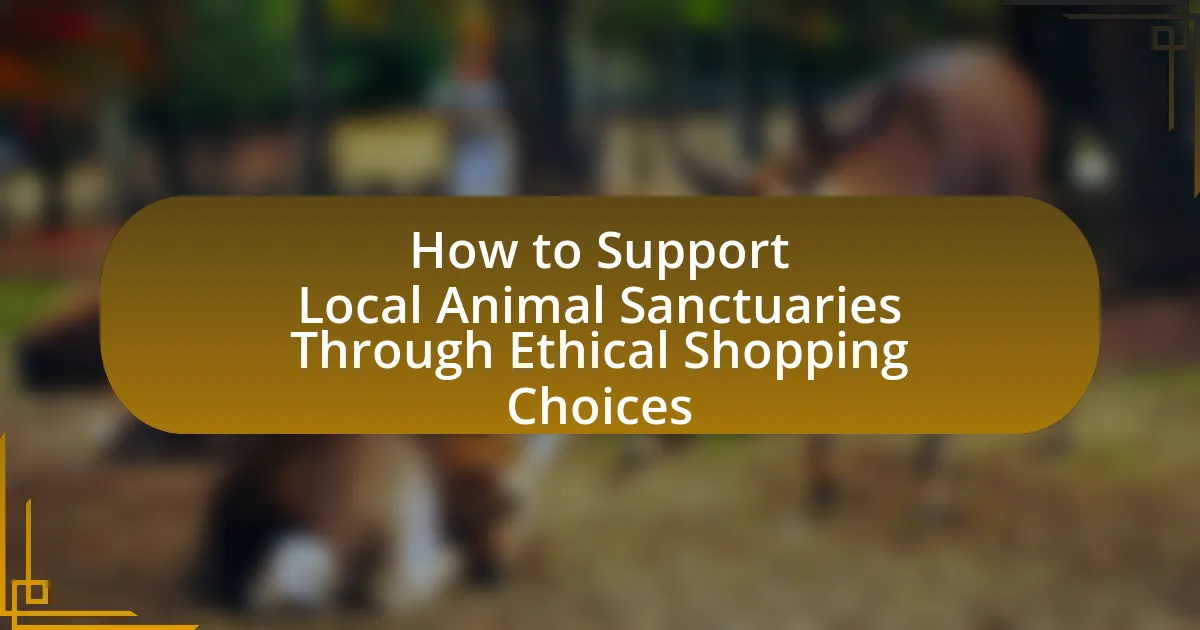The article examines the ethics of veganism, focusing on consumer choices and their impact on animal rights. It discusses the ethical considerations surrounding veganism, including animal welfare, environmental sustainability, and health benefits. Key motivations for adopting a vegan lifestyle are explored, particularly the opposition to animal cruelty and exploitation. The article also addresses the philosophical frameworks supporting vegan ethics, critiques of ethical veganism, and the influence of consumer demands on animal agriculture. Additionally, it highlights the challenges faced by ethical vegans and offers practical strategies for navigating social situations and making ethical consumer choices.

What are the ethical considerations surrounding veganism?
The ethical considerations surrounding veganism primarily involve animal rights, environmental sustainability, and human health. Veganism advocates for the belief that animals have the right to live free from exploitation and harm, which is supported by the argument that industrial animal farming often leads to suffering and death for sentient beings. According to a 2019 study published in the journal “Nature,” animal agriculture is responsible for approximately 75% of global deforestation and contributes significantly to greenhouse gas emissions, highlighting the environmental impact of meat consumption. Furthermore, ethical veganism promotes the idea that plant-based diets can lead to better health outcomes, as research indicates that vegans tend to have lower risks of heart disease, hypertension, and certain cancers. These ethical considerations collectively argue for a shift towards veganism as a means to promote compassion, sustainability, and health.
Why do consumers choose veganism for ethical reasons?
Consumers choose veganism for ethical reasons primarily to oppose animal cruelty and exploitation. This choice is driven by the belief that animals have rights and should not suffer for human consumption. Research indicates that approximately 84% of vegans cite animal welfare as a key motivation for their dietary choices, highlighting the ethical stance against practices such as factory farming, which often involves inhumane treatment of animals. Furthermore, studies show that individuals who adopt veganism for ethical reasons often seek to align their lifestyle with their values, promoting compassion and reducing harm to sentient beings.
What role do animal rights play in the decision to adopt a vegan lifestyle?
Animal rights significantly influence the decision to adopt a vegan lifestyle by motivating individuals to avoid animal exploitation and suffering. Many people choose veganism as a moral stance against practices such as factory farming, which is associated with severe animal welfare violations, including confinement, mutilation, and inhumane slaughter methods. Research indicates that approximately 70% of vegans cite animal welfare as a primary reason for their dietary choice, highlighting the ethical imperative to protect sentient beings from harm. This ethical consideration drives the adoption of veganism as a means to align personal values with dietary practices, reinforcing the commitment to animal rights.
How does veganism address issues of animal suffering and exploitation?
Veganism addresses issues of animal suffering and exploitation by eliminating the consumption of animal products, thereby reducing demand for industries that harm animals. By choosing plant-based diets, individuals actively oppose practices such as factory farming, where animals are often subjected to inhumane conditions, including confinement, mutilation, and premature death. Research indicates that adopting a vegan lifestyle can significantly decrease the number of animals raised for food; for instance, a study published in the journal “Nature” found that a global shift to plant-based diets could reduce food-related greenhouse gas emissions by up to 70% by 2050, which correlates with less intensive animal farming. Thus, veganism serves as a direct response to the ethical concerns surrounding animal welfare and exploitation.
What philosophical frameworks support vegan ethics?
Utilitarianism, deontology, and virtue ethics are the primary philosophical frameworks that support vegan ethics. Utilitarianism argues for the minimization of suffering and maximization of well-being, which aligns with veganism’s goal to reduce animal suffering and promote health. Deontology emphasizes moral duties and rights, asserting that animals have intrinsic rights that should not be violated, thus supporting the ethical treatment of animals through veganism. Virtue ethics focuses on the character and virtues of individuals, promoting compassion and empathy towards all sentient beings, which aligns with the principles of veganism. These frameworks collectively provide a robust ethical foundation for adopting a vegan lifestyle.
How do utilitarianism and deontology relate to veganism?
Utilitarianism and deontology relate to veganism through their differing ethical frameworks regarding animal rights and welfare. Utilitarianism advocates for actions that maximize overall happiness and minimize suffering, which supports veganism as it seeks to reduce animal suffering and promote well-being by avoiding animal products. In contrast, deontology emphasizes the moral duty to treat individuals with respect and adhere to rules, which can also support veganism by asserting that animals have rights that should not be violated, regardless of the consequences. Both ethical theories provide a rationale for adopting veganism, highlighting the moral implications of consumer choices on animal rights.
What are the criticisms of ethical veganism?
Criticisms of ethical veganism include its perceived elitism, potential nutritional deficiencies, and the argument that it may not effectively address broader systemic issues in animal agriculture. Critics argue that ethical veganism can be inaccessible to lower-income individuals due to the higher cost of plant-based foods, which can perpetuate social inequality. Additionally, some nutritionists point out that a poorly planned vegan diet may lead to deficiencies in essential nutrients like vitamin B12, iron, and omega-3 fatty acids. Furthermore, opponents contend that focusing solely on individual dietary choices distracts from necessary systemic changes in agricultural practices and animal welfare policies, which are crucial for meaningful reform in the treatment of animals.

How do consumer choices impact animal rights?
Consumer choices significantly impact animal rights by influencing demand for animal products and the treatment of animals in various industries. When consumers opt for plant-based alternatives, they reduce the demand for meat, dairy, and other animal-derived products, leading to a decrease in animal farming practices that often involve cruelty and exploitation. For instance, a study published in the journal “Nature” found that adopting a vegan diet could reduce an individual’s carbon footprint from food by up to 73%, which correlates with less intensive animal farming and better animal welfare standards. Additionally, consumer advocacy for cruelty-free products encourages companies to adopt humane practices, thereby promoting animal rights.
What influence do consumer demands have on animal agriculture?
Consumer demands significantly influence animal agriculture by shaping production practices and market trends. As consumers increasingly prioritize ethical treatment of animals, sustainability, and health, agricultural producers adapt by implementing more humane practices, such as cage-free housing for hens and pasture-raised livestock. For instance, a 2021 survey by the American Farm Bureau Federation indicated that 70% of consumers are willing to pay more for products that ensure animal welfare, prompting farmers to shift towards more ethical farming methods. This shift not only reflects changing consumer preferences but also drives regulatory changes and industry standards aimed at improving animal welfare in response to market demands.
How does the rise of vegan products affect traditional farming practices?
The rise of vegan products significantly impacts traditional farming practices by reducing demand for animal-based agriculture. As consumer preferences shift towards plant-based diets, traditional livestock farming faces economic pressures, leading to decreased livestock populations and altered land use. For instance, a report by the Food and Agriculture Organization indicates that global meat consumption has plateaued, prompting farmers to adapt by diversifying into crop production or sustainable practices to remain viable. This transition not only affects the economic landscape of rural communities but also encourages a reevaluation of agricultural methods, emphasizing sustainability and ethical considerations in food production.
What are the economic implications of shifting consumer preferences towards veganism?
Shifting consumer preferences towards veganism lead to significant economic implications, including changes in agricultural production, market dynamics, and employment patterns. As demand for plant-based products increases, traditional livestock farming may decline, resulting in reduced revenues for meat and dairy industries. For instance, a report by the Good Food Institute indicates that the plant-based food market grew by 27% in 2020, reflecting a shift in consumer behavior that impacts supply chains and pricing structures. Additionally, this transition can create new job opportunities in plant-based food production and distribution, while potentially displacing workers in conventional animal agriculture. The overall economic landscape adapts to these preferences, influencing investment in sustainable practices and innovation within the food sector.
How can consumers advocate for animal rights through their choices?
Consumers can advocate for animal rights through their choices by opting for cruelty-free products and supporting brands that prioritize animal welfare. By purchasing items labeled as cruelty-free, consumers directly contribute to reducing animal suffering in industries such as cosmetics and fashion. Research indicates that the global cruelty-free cosmetics market is projected to reach $12.5 billion by 2025, reflecting a growing consumer demand for ethical products. Additionally, choosing plant-based diets can significantly decrease the demand for animal agriculture, which is linked to numerous animal welfare issues. Studies show that adopting a vegan diet can reduce an individual’s carbon footprint by up to 73%, further aligning consumer choices with animal rights advocacy.
What role do certifications and labels play in ethical consumerism?
Certifications and labels serve as critical tools in ethical consumerism by providing consumers with verified information about the ethical standards of products. These certifications, such as Fair Trade, USDA Organic, and Vegan, help consumers make informed choices that align with their values regarding animal rights, environmental sustainability, and social justice. For instance, a study by the Nielsen Global Corporate Sustainability Report found that 66% of consumers are willing to pay more for sustainable brands, indicating that certifications influence purchasing decisions. By ensuring transparency and accountability, certifications and labels empower consumers to support businesses that adhere to ethical practices, thereby promoting a market that prioritizes ethical considerations.
How can consumers support animal welfare organizations?
Consumers can support animal welfare organizations by donating funds, volunteering time, and advocating for animal rights. Donations provide essential financial resources that enable these organizations to carry out their missions, such as rescuing animals and funding educational programs. Volunteering allows consumers to contribute their skills and time directly to the organizations, enhancing their operational capacity. Advocacy efforts, including raising awareness through social media or participating in campaigns, help to influence public opinion and policy regarding animal welfare. According to the ASPCA, financial contributions are crucial for sustaining animal welfare initiatives, demonstrating that consumer support can significantly impact the effectiveness of these organizations.

What are the challenges faced by ethical vegans?
Ethical vegans face several challenges, including social stigma, limited food options, and difficulties in accessing vegan products. Social stigma arises from societal norms that often prioritize animal consumption, leading to misunderstandings and negative perceptions of veganism. Limited food options can make dining out or attending social events challenging, as many restaurants and gatherings may not offer suitable vegan choices. Additionally, ethical vegans may struggle to find products that align with their values, as many items contain animal-derived ingredients or are tested on animals, complicating their consumer choices. These challenges highlight the complexities of maintaining an ethical vegan lifestyle in a predominantly non-vegan society.
What social and cultural barriers exist for those adopting veganism?
Social and cultural barriers for those adopting veganism include societal norms, family expectations, and cultural traditions that prioritize animal-based diets. Many cultures have deep-rooted culinary practices that revolve around meat consumption, making it challenging for individuals to adopt a vegan lifestyle without facing social ostracism or familial pressure. For instance, in cultures where communal meals are significant, the absence of traditional animal products can lead to feelings of exclusion or discomfort during gatherings. Additionally, misconceptions about veganism, such as the belief that it is an elitist or impractical choice, can further alienate potential adopters. Research indicates that social acceptance plays a crucial role in dietary choices, with studies showing that individuals are less likely to adopt veganism if they perceive it as socially unacceptable or if their social circles do not support such dietary changes.
How do societal norms and traditions impact vegan choices?
Societal norms and traditions significantly influence vegan choices by shaping perceptions of food and dietary practices. In cultures where meat consumption is a central aspect of social gatherings and traditional meals, individuals may feel pressured to conform to these norms, making it challenging to adopt a vegan lifestyle. For instance, in many Western societies, barbecues and holiday feasts often center around meat dishes, which can marginalize vegan options and discourage individuals from choosing plant-based diets. Additionally, research indicates that social acceptance plays a crucial role in dietary decisions; a study published in the journal “Appetite” found that individuals are more likely to adopt veganism in supportive social environments where plant-based eating is normalized. Thus, societal expectations and traditions can create barriers or support systems that directly impact the likelihood of individuals choosing vegan diets.
What challenges do vegans face in accessing vegan options?
Vegans face significant challenges in accessing vegan options due to limited availability, higher costs, and lack of awareness among food providers. Many regions, especially rural areas, have fewer grocery stores and restaurants that offer a variety of vegan products, making it difficult for vegans to find suitable meals. Additionally, vegan options often come at a premium price compared to non-vegan alternatives, which can deter consumers from choosing plant-based diets. A study by the Plant Based Foods Association in 2021 indicated that only 30% of grocery stores in the U.S. carry a wide range of vegan products, highlighting the accessibility issue. Furthermore, many food service establishments lack knowledge about vegan dietary needs, leading to inadequate menu options and cross-contamination risks.
How can ethical vegans overcome these challenges?
Ethical vegans can overcome challenges by actively seeking out and supporting cruelty-free brands and products. By prioritizing companies that align with their values, ethical vegans can ensure their consumer choices contribute to animal welfare. Research indicates that the global market for vegan products is growing, with a 27% increase in sales from 2019 to 2020, demonstrating a rising demand for ethical options. Additionally, ethical vegans can engage in community initiatives, such as local vegan meetups or advocacy groups, which provide support and resources for navigating challenges. This collective effort fosters a stronger network and amplifies their impact on animal rights.
What strategies can vegans use to navigate social situations?
Vegans can navigate social situations by proactively communicating their dietary preferences and seeking out vegan-friendly options. This approach allows vegans to inform hosts or friends about their needs, which can lead to more inclusive meal planning. Additionally, bringing a vegan dish to share can ensure there is something suitable for them to eat while also introducing others to vegan cuisine. Research indicates that open dialogue about dietary choices fosters understanding and acceptance among peers, making social interactions smoother for vegans.
How can community support enhance the vegan experience?
Community support can significantly enhance the vegan experience by providing resources, social connections, and shared knowledge among individuals. This support fosters a sense of belonging, which can motivate individuals to maintain their vegan lifestyle. Research indicates that social networks play a crucial role in dietary adherence; for instance, a study published in the journal “Appetite” found that individuals with supportive social circles are more likely to stick to their dietary choices, including veganism. Additionally, community events, such as potlucks and workshops, create opportunities for sharing recipes and cooking techniques, further enriching the vegan experience.
What practical tips can help individuals make ethical consumer choices?
To make ethical consumer choices, individuals should prioritize purchasing products that are certified organic, fair trade, or cruelty-free. These certifications indicate that the products meet specific ethical standards, such as sustainable farming practices, fair labor conditions, and no animal testing. For instance, the Fair Trade certification ensures that farmers receive fair compensation, which supports their communities and promotes sustainable agriculture. Additionally, individuals can research brands and companies to understand their ethical practices, such as sourcing materials responsibly and minimizing environmental impact. Engaging with local businesses and supporting ethical brands can further enhance ethical consumerism, as local businesses often have a smaller carbon footprint and contribute to the local economy.




